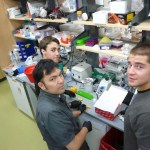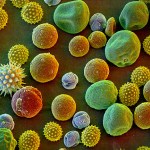food
Liz Borkowski writes: Mark Pendergrast wrote yesterday about how politics plays into the work of the EIS, and it's something that I kept noticing as I read Inside the Outbreaks. As he points out, my post last week highlighted the solution to the Reye's Syndrome puzzle - which was solved by Karen Starko, who's also one of the Book Club bloggers! - but didn't get into the larger issue: there can be a big difference between solving the puzzle and solving the problem. In yesterday's post, Mark writes:
Although Karen's and subsequent CDC studies clearly demonstrated that giving children aspirin…
For the Grow your Own Bakeoff, a blogging event that celebrates the foods we grow or raise ourselves and the dishes we make using our homegrown products, I baked a Swiss chard-Gruyere pie.
Here is the recipe: First, gather as many ingredients as you can from your garden. In our garden, I found multi-colored swiss chard, Kale, chives, thyme and parsley. Our young hens, Snickerdoodle, Lemon Drop, Raven, Cheez-It and Oreo provided the eggs.
The backdrop to our garden is a mural on the side of our barn, painted with California poppies, rice plants, sunflowers and (look closely) a red…
Mark Pendergrast writes: Thanks to commentators Liz Borkowski, Karen Starko, Steve Schoenbaum, and Mark Rosenberg for their thoughtful posts, though it appears that Mark Rosenberg's post got cut off after his first-paragraph query asking why anyone would go into the field of public health. I will wait to respond to his post once I see him answer his own question! In the meantime, there is much to talk about. I (Mark Pendergrast) will respond to parts of what Liz, Karen, and Steve wrote in order, along with other blogger comments.
Let me respond first to a blog comment from John Willis, who…
A couple of related items from the uncomfortable questions comments. First, from Elizabeth:
What's your favorite homemade supper? What is your favorite thing to cook?
then a bit later from CCPhysicist:
What is the WORST thing that Kate ever cooked? What was your own worst cooking disaster?
This is a tough question, because I like to cook, and I like pretty much everything I cook. I don't get to do much complicated cooking these days, though, because with SteelyKid running around, it's a little risky to do much beyond "grill meat, heat vegetables, serve."
My favorite thing to cook is…
It is hot and sticky here - only low 80s, but humid. This afternoon we should have rain, but in the meantime the sun is shining and the very last thing I feel like doing is putting any dinner on anywhere near the house. We're out of propane for the grill, and let's be honest, it isn't like it is local, homegrown propane. What's a girl who likes dinner to do except move it outside? And my favorite way is out into to my solar oven.
I've made a lot of solar ovens over the years, and they all worked to one degree or another, so I'm kind of embarassed how much I love my Global Sun Oven, which…
I've heard from quite a number of people lately who have started gardening, but find that they can't get everyone in their family onboard with the actual eating part of all these veggies. Here are some thoughts (from 2008) on how to to convince people to try the kohlrabi. Really.
I think I get more requests for ideas for helping people who are on-board with the idea of sustainable eating get the rest of their families on-board than on any other food storage topic.
In a perfect world, of course, our partners, roommates, children and other assorted members of our lives would say "Oh, I'm so…
The first (and sometimes 3rd, 12th, 25th, 134th...) step of any genetic engineering experiment is often extracting DNA from some organism or another. While novel gene synthesis technology will likely make this procedure obsolete, these days it's still most economical to do it by hand. Extracting DNA from fruits like strawberries has also seen a popular resurgence thanks to groups like DIYbio, with instructions for making DNA shots available online for a fun and nerdy party activity. Today my iGEM team extracted RNA from strawberries and oranges to isolate the genes responsible for strawberry…
iGEM officially starts for the Harvard team tomorrow for some good old-fashioned fun with BioBricks, arabidopsis, protein-based sweeteners, and shRNA! Our goal is to make a system for genetically engineering plants safely and easily with some hopefully fun and useful applications in the short term. iGEM (the International Genetically Engineered Machines competition) is about fun and open science, so we hope you enjoy following along with our adventure on our wiki, blog, twitter, or even become a fan on facebook. As a proud teaching fellow I'll be posting updates here periodically all summer,…
tags: Natural Harvest: A Collection of Semen-Based Recipes, cookbooks, food, humor, weird, strange, wow, books
I thought I'd read or heard of absolutely everything, but apparently, this is not the case. It turns out that the spousal unit found a cookbook that he thinks is "hilarious" .. which means that he has to share it with me, too. Being a bibliophile, I always appreciate learning about new titles on the market, but this book surely is the strangest ever!
The author (whom I do not know), Fotie Photenhauer, writes:
Semen is not only nutritious, but it also has a wonderful texture and…
Thanks to reader Sunshine for forwarding me this AP article, which I think does a really good job of pointing up something I've been talking about for a long time - the food crisis that was in the news two years ago never actually went away. While food prices stabilized in the developed world and things like the economic crisis shoved the situation of the poor and hungry off the front pages, that doesn't mean the food crisis came to an end.
With food costing up to 70 percent of family income in the poorest countries, rising prices are squeezing household budgets and threatening to worsen…
So, hi, Scienceblogs. I'm thrilled to be joining the conversation here.
By way of introduction, I'm Maryn McKenna, journalist and author and sole proprietor of Superbug, which has been running for 3+ years at Blogger but moves over here today, thanks to an invitation from the Sb staff and some extremely kind support from friends and colleagues who are already here.
Superbug began as online notes and digital whiteboard for my new book, SUPERBUG: The Fatal Menace of MRSA (Free Press/Simon & Schuster), which is a narrative investigation of the international epidemic of drug-resistant staph.…
The Economist recently published a special report on water, which summarizes the difficulty of ensuring adequate clean water supplies for a growing global population. (It also touches on the related challenge of sanitation, which affects water quality.) Agriculture accounts for nearly 70% of the world's water use, although that number varies by region. In the US, 41% of water goes to agriculture; in India, the number is close to 90%.
India also has the distinction of being the country that draws the most groundwater, the Economist reports. With most areas subsidizing electricity, it's…
Today, when I was trolling through a stack of dutifully hand-recorded interview notes and research articles with punny names such as, "Reaping the benefits," I came across a fact I had long forgotten about, from the International Food Policy Research Institute: For every dollar of additional income created in the agriculture sector, the economy as a whole will grow by about 2.5 dollars.
This bite of information stuck out at me today, at a time when I'm grappling with how to make a conversation about agriculture, the focus of "Food 2.0: Feeding a Hungry World," eye-catching to audience…
A recent New York Times article tells us that what many people call food allergies are actually simple intolerances, and that allergies are being dangerously overdiagnosed. What is a true food allergy, and what can be done to fix them besides banning peanuts from schools and avoiding foods that make us itchy?
Allergies are caused by an inappropriate immune response to common things in the environment. Usually the offending allergen is a protein that comes from plants or animals like pollen or dander. Instead of the immune system recognizing that these proteins are harmless, it instead…
The World Science Festival, is a five day-long extravaganza of science in New York City that is coming up this year on June 2-6. The World Science Festival (now in it's third year) is not only for adults interested in science society- it is for kids, too. That why I will bring my 9 year old daughter with me. She is clamouring for high heels to wear to the opening night gala honoring Stephen Hawking. On Sunday, the heels will come off for some fun at the Festival Street Fair, featuring Discovery Theater and Author's Alley.
On Friday evening, I will participate in a panel called Food 2.0:…
This Op-Ed just published today in the NY TImes.
Here it is with links and a few edits.
A REPORT by the National Research Council last month gave ammunition to both sides in the debate over the cultivation of genetically engineered crops. More than 80 percent of the corn, soybeans and cotton grown in the United States is genetically engineered, and the report details the "long and impressive list of benefits" that has come from these crops, including improved soil quality, reduced erosion and reduced insecticide use.
It also confirmed predictions that widespread cultivation of these crops…
Salmonella is an enteric pathogen that causes quite a lot of foodborne illness. I learned there were several species of Salmonella bacteria of which the cause of typhoid fever was called Salmonella typi. Spread via food and water it used to kill a lot of people in the 19th and early 20th centuries. Nowadays all Salmonella bacteria are considered to be different subspecies (serovars) of just one species, Salmonella enterica. There are more than 2500 of them, of which several routinely infect humans. Salmonella enteritidis is the most common form of foodborne bacterial infection (NB: many…
Regular readers know I don't have strong feelings about nutritional supplements and herbal medicine, unlike some of my medical blogger colleagues. I don't recommend or use them but for the most part it's not a subject that really gets me going, probably because I don't know enough about abuses. A lot of regular medical practice is not that soundly based, either, and some of it is pretty harmful. That's also not a subject that gets me going.
The one prejudice I do have I got from my physician and surgeon father. His diet advice was "everything in moderation." That goes for nutritional…
Everybody (including us) is talking about people crossing US borders illegally, but lots of things cross borders (pollution, wildlife, pathogens). Services cross borders whenever we reach a call center in Bangladore and of course so do commodities. Commodities like foodstuffs or medicines or toys may or may not be subject to regulations for safety and many are subject to tariffs to protect domestic industries. It turns out that a lot of these commodities are also in this country "illegally." Take honey:
The tariffs were attached to the import of Chinese honey about two years ago because…
Self medicating for mood disorders is well known. It is often quite harmful, with the chief culprits being ethyl alcohol and nicotine. But there are others. One that comes up often is chocolate as an antidote to feelings of depression. Not everyone who eats chocolate is depressed, of course. Probably most of us who do it do it because we like chocolate. When I was in elementary school I used to eat a lot of Hershey bars after school. They cam in six-packs and one memorable day I found two whole packs and one pack with a single bar missing. I ate all 17 in one sitting. Two hours later I ate…


